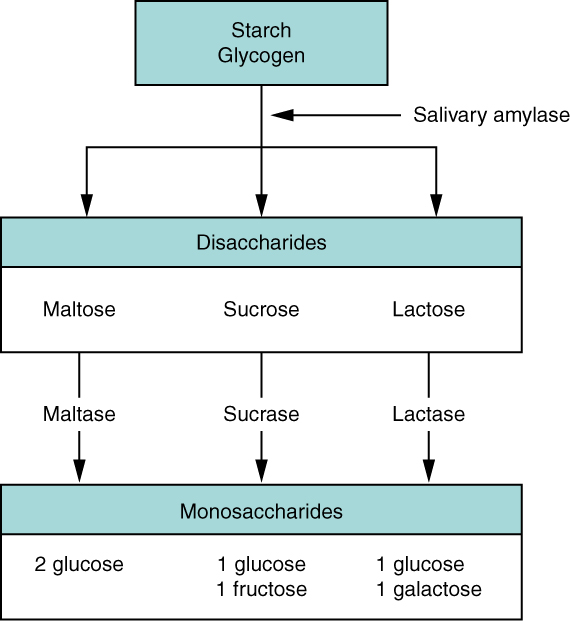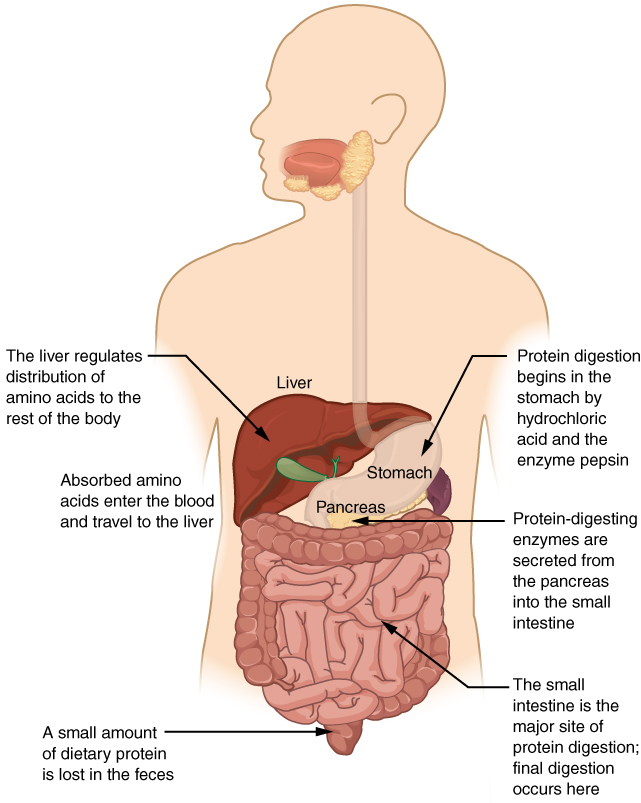All digestive enzymes are proteins, but each with its specific function, and in this article, we will take a deep dive into various such enzymes.
Digestive enzyme examples :
- Ptyalin
- Pancreatic Amylase
- Lactase
- Sucrase
- Maltase
- Alpha-Dextrinase
- Enterokinase
- Pepsin
- Pancreatic Proteases
- Peptidases from Microvilli
- Nucleases
- Phosphatases
- Lingual Lipase
- Pancreatic Lipase
- Cholesterol Esterase Hydrolase
- Phospholipase A2
Ptyalin
Its an alpha-amylase found in saliva secreted by salivary glands. It partially hydrolyses starch into maltose and other oligomers containing 3 to 9 glucose subunits.
Pancreatic Amylase
This enzyme is also an alpha-amylase secreted by the pancreas and is almost identical in its function to ptyalin. However, one major difference is its potency, as it is several times more powerful than ptyalin.
Thus, almost all carbohydrates have been converted into maltose and other small glucose oligomers after passing through the duodenum.
Lactase
Cells lining the villi of the small intestine secrete this enzyme, and it is responsible for splitting a lactose molecule into a molecule of glucose and galactose.
Sucrase
This enzyme is also secreted by cells lining the small intestine’s villi, and it is responsible for splitting sucrose molecules into fructose and glucose molecules.
Maltase
This enzyme is also secreted by cells lining the small intestine’s villi, and it is responsible for splitting a maltose molecule into two glucose subunits.
Alpha-dextrinase
This enzyme from the brush border cells of microvilli cleaves one glucose unit at a time from the alpha-dextrins (formed after the action of pancreatic and salivary amylases on carbohydrates).

Enterokinase
The small intestine secretes this enzyme, and it works on trypsinogen (inactive enzyme) to convert it to trypsin (protein digesting active form of this enzyme). Trypsin further activates other proteases.
Pepsin
The stomach secretes this protein-digesting enzyme, and it is functional at a low pH of 2.0-3.0. The enzyme loses its catalytic ability above pH 5.0. It digests proteins into proteoses, peptones, and other polypeptides.
Pepsin is the main enzyme responsible for the digestion of collagen protein found in meat. It is only responsible for 10-20% of total protein digestion as the complete digestion will occur in the small intestine.
Pancreatic Proteases
Pancreatic proteases include various protein-digesting enzymes secreted by the pancreas. These include trypsin, chymotrypsin, carboxypeptidases, and elastase enzymes.
These enzymes digest proteoses, peptones, and large polypeptides into smaller oligomers and amino acids. The elastase enzyme degrades elastin fibers and thus helps in meat digestion.
So, pancreatic proteases digest most proteins to the levels of dipeptides and tripeptides.
Peptidases from Microvilli
Microvilli of jejunum and duodenum secrete various types of dipeptidases and aminopolypeptidases. These enzymes are responsible for cleaving the remaining peptones and smaller polypeptides into amino acids, dipeptides, and tripeptides.
These dipeptides and tripeptides enter enterocytes for further degradation until the single amino acid level.

Nucleases
Pancreas also secretes two nucleases to digest nucleic acids in food. Ribonucleases digest ribonucleic acid/RNA, and deoxyribonucleases digest deoxyribonucleic acid/DNA into nucleotides.
Phosphatases
These enzymes from enterocytes work with nucleosidases to properly degrade nucleotides into pentose sugar + nitrogenous base-pair + phosphate group.
Lingual Lipase
This enzyme is secreted by lingual glands in the mouth and is responsible for the digestion of a small proportion of triglycerides (less than 10%) in the stomach.
Pancreatic Lipase
This enzyme is by far the most important enzyme for digestion of emulsified (remember that fats are emulsified by bile and physical agitation in the small intestine, but bile is not an enzyme) triglycerides into free fatty acids and 2-monoglycerides. The enzyme surprisingly works within minutes.
Enteric lipase is present in the small intestine’s enterocytes; generally, this enzyme is not needed.
Cholesterol Ester Hydrolase
This enzyme secreted by the pancreas is responsible for digesting cholesterol esters into cholesterol and a free fatty acid molecule.
Phospholipase A2
Phospholipase is yet another pancreatic enzyme responsible for the hydrolysis of phospholipids.
Conclusion
In this post we have discussed about various enzymes playing key roles in digestion of carbohydrates, proteins, fats, and nucleic acids.
Also Read:
- Do prokaryotes have exons
- Is endocytosis hypertonic
- Do protists have a cell wall
- Function of flagella
- Ecosyetm examples
- Is dna replication bidirectional
- Does translation occur in the cytoplasm
- Spore forming bacteria examples
- Does the krebs cycle produce water
- Holoenzyme and enzyme
Hi….I am Ashish Nandal, I have completed my Master’s in Biotechnology. I always like to explore new areas in the field of Biotechnology.
Apart from this, I like to read, travel, and photography.
